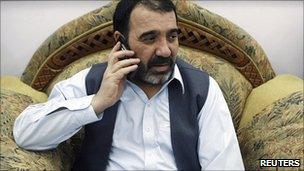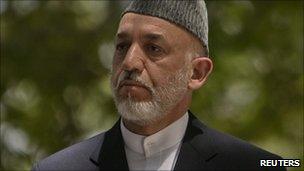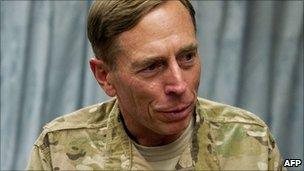Ahmad Wali Karzai - the charm and the controversy
- Published
- comments

Like him or loathe him, Ahmad Wali Karzai could not be ignored by anyone operating in Kandahar
Ahmad Wali Karzai, who has been is shot dead in Kandahar, was a charming but inscrutable power broker in the traditional Afghan mould.
Successive Western officials or generals realised that whether they liked or loathed him, it was very hard to get anything done in "AWK's" Kandahar power base without him.
Any journalist arriving at his offices, as I did last August, keen to get to grips with a man accused of everything from being a drug lord to having his political opponents killed soon found themselves wrong footed.
Ahmad Wali Karzai, who had spent years as an exile in Chicago could deploy English with skill and subtlety, happily chat about British Premier League soccer (or indeed US Major League baseball), entertain you with a delicious lunch, and paint himself as an indispensible pillar of the community in a city that has long been seen as the great prize in Afghanistan.
He would bat aside accusations of wrong doing with, "nothing has been proven", not perhaps the most convincing of denials.
Special forces
At the same time, he would speak passionately about the sacrifices made by pro-government Afghans in that cockpit of the insurgency, Kandahar.
For a time, during 2009, the Americans grew so angry at the reports of his wrongdoing that they tried to gather evidence in order to convince his half brother, President Hamid Karzai, to arrest him.

In 2009 US officials tried to gather evidence to persuade President Karzai to arrest his half brother
American officials told the New York Times that Ahmad Wali Karzai was a major drug dealer. There was also talk of unleashing American special operations forces on him, amid claims that his militia of armed men was responsible for much of the violence in Kandahar.
When US General David Petraeus took command of Nato forces in Afghanistan in 2010 it was reported that he soon went to meet Ahmad Wali Karzai, urging him to support Nato operations around his city or face a raid by US special forces.
One officer in the city quibbled at this version, telling me that the general's message was explicitly, "behave or we will kill you". However both Gen Petraeus and Ahmad Wali Karzai denied it was that kind of threatening conversation.
Whatever words were used between general and power broker, it soon became clear that Nato has concluded it could not produce hard evidence against Ahmad Wali Karzai and that it was better to work with him than against him.
Tribal threat
By the summer of 2010, the alliance was embracing him once more, seeking his help in co-ordinating Operation Hamkari, the series of offensives around the southern city that formed one of the centre pieces of the Obama administration surge.
In the end though, Ahmad Wali Karzai's power base boiled down to members of his tribe, the Popalzai. A campaign of assassination by the Taliban prevented a broader following, and there was widespread resentment among other tribes of the hundreds of millions being pocketed by the Popalzai through lucrative security and other contracts.

When he took command Gen Petraeus urged Karzai to support Nato actions in and around Kandahar
Many in the city started to view Ahmad Wali Karzai as someone who fomented continued fear and even assassination, because he had so much to lose through the establishment of peace. Of course he would have shrugged and dismissed such ideas, arguing instead that he simply wanted to bring order to his home region.
Whatever criticisms may have been levelled at Ahmad Wali Karzai, it is only fair on this particular day, to praise some of his qualities.
Whereas so many Afghans who have profited from the war spend their times in cool villas in Dubai, Mr Karzai rarely left Kandahar despite the many previous attempts on his life.
He was also ready to explain himself and argue his case to many journalists who beat a path to his door, despite the fact that quite a few arrived with accusations - of drug trafficking or tribalism - that might irk even the most patient of interviewees.
The Taliban are already rejoicing at Ahmad Wali Karzai's demise. Perhaps the only good that could come out of it would be a fairer distribution of government work among Kandahar's tribes.
But that may be little more than a pious hope, since many Popalzai will be out for revenge, and the struggle to succeed Mr Karzai could provoke serious blood letting.